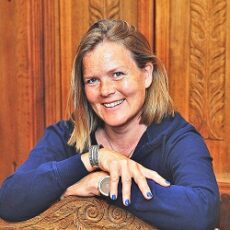
Which tourism businesses should we celebrate right now for their unwavered sustainability efforts and success? Who are the sustainable tourism champions to go to for inspiration and encouragement in these challenging times?
We asked our panel of sustainable tourism specialists. Below the answers (highlighted respondents are available as consultants or speakers).
 Jonathon Day
Jonathon Day
Interview | Speaker profile
I am really impressed by the work of some of the tourism intermediaries and their foundations:
- G Adventures and Planeterra
- Intrepid
- Travel Corp and Treadright
My plea to the hotel companies – that I know are doing great work – is to find ways to overcome ‘green hushing’. It is time to be more forthcoming and transparent.

Kirsi Hyvaerinen
Interview | PRÁTTO Consulting d.o.o | Speaker profile
From my immediate neighbourhood – Eco village Nevidio
Among my clients and friends in Albania – the Elite Travel Group and the #SpoonbillNest 2nd Youth Conference in 2020, and 3e Travel from Montenegro.
Sustainability in these cases is understood as accountability and support, e.g. keeping their staff even during challenging circumstances, and being pioneers in implementing sustainability certifications with 3rd party assessments.
 Willy Legrand
Willy Legrand
Interview | Speaker profile
The Long Run is a membership network committed to supporting sustainability endeavours across all nature-based tourism businesses. The ecotourism sector depends on tourism-driven funding to undertake the conservation and restoration surrounding the fauna and flora at destinations.
All members of the Long Run have a direct impact on the conservation of over 23 million acres of biodiversity and a direct or indirect connection to the lives of 750,000 people. Throughout the past 12 months, The Long Run has kept active and supporting or reinforcing their 4Cs framework – Conservation, Community, Culture and Commerce.
In 2020, The Long Run joined the Soul Coalition under the umbrella of the Transformational Travel Council along with the Center for Responsible Travel (CREST), the Quiet Parks International (QPI) and For Good Movement: B Tourism to mention a few. The objective is to scale the overall impact these organisations have on the future of tourism and sustainability.
Albert Salman
Interview
Especially brave and daring were those businesses that engaged in the Good Travel Seal certification, let me highlight those in Bonaire (Dutch Caribbean), in North-East Yilan coast (Taiwan), and in Tivat (Montenegro). It helps that this new certification is very affordable, but these are strongly committed business communities under the inspiring leadership of Gerjanne Voortman (Bonaire), Monique Chen (Taiwan) and Kirsi Hyvaerinen (Tivat)!
Amine Ahlafi
Interview
Hoteliers have made efforts to adopt health and safety measures for their guests due to the pandemic to ensure safe stays for their customers. They also fought to preserve jobs and avoid closing their establishments to minimise their impacts on their stakeholders. Many establishments have reworked their products and offer to fit into the new normal.
Anna Spenceley
Interview
At Shinta Mani Wild in Cambodia, staff who were working in the hotel have been supporting conservation while tourists are away. They have been patrolling areas of the Cardamom National Forest for traps and fires during the pause in tourism.
andBeyond’s Africa Foundation raised over USD510,000 through its COVID-19 campaign in 2000, to support 73 African communities with food parcels, clinic support, water access, business support, PPE for schools and support to creches and schools.
Bulungula Lodge on South Africa’s Wild Coast has been using its premises as a place for local community members to quarantine, particularly the elderly and those with pre-existing conditions who are at higher risk from the virus.
Intrepid Travel, which raised over £11,000 through the non-profit The Intrepid Foundation to help feed more than 350 families (1700 people) in Peru’s Sacred Valley. The meals were distributed in partnership with the NGO MEDLIFE, which helps low-income communities in Latin America get medicine, education and food aid.
Fiona Jeffery
Interview
Imagine Travel based in the UK that calculates the carbon footprint of all their holidays as a tour operator.
Gianna Moscardo
Interview
In my part of the world, Skyrail, Paronella Park and Lady Elliott Island continue to pursue their sustainability programs.
Kevin Teng
Interview
My own company, Marina Bay Sands has expanded our efforts and we just made it to the DJSI World list. But we are a large F500 business. Aside from that, there are quite a few sustainable food suppliers that have accelerated their efforts, including alternative protein companies.
Lucy McCombes
Interview
I think ABTA has demonstrated great leadership representing the UK industry and maintaining their focus on encouraging their tour operator and accommodation members to continue/step up their sustainability commitments as part of a positive response to COVID-19. For example, their Tourism for Good report and their sustainability support services for its members, including Travelife certification, new on-line sustainability resources, training, research findings, events etc.
Maja Pak
Interview
All businesses should be encouraged to make sustainability a key part of their business model since the trends in tourism are going to develop in this way. In Slovenia, we have decided to give special attention and devote several projects to businesses that operate in the food and beverage sector, especially restaurants and other hospitality establishments. This is in part because Slovenia won the title of European Region of Gastronomy 2021, but also because these businesses have important multiplicative effects.
A well-known restaurant or a hotel may impact the whole supply chain, the producers, the farmers, and at the same time influence the consumer’s behaviour by communicating the importance of local and healthy food. By managing it in a sustainable, wise manner, the income can stay mostly in the local environment. Gastronomy is also something that illustrates and is part of the culture of the destination, so it is very important for the general image of the destination.
Masaru Takayama
Interview
Japan Alliance of Responsible Travel Agencies (JARTA) members. Namely:
- Hokkaido Treasure Island Travel
- Destination Asia Japan
All three companies are benchmarking with Travelife to demonstrate their good practices in the development of sustainable tourism.
Natalia Naranjo Ramos
Interview
Destinations, businesses and communities have to work very close towards sustainability, so my first options would be Yarumo Blanco Community-based association in the Otun-Quimbaya Fauna and Flora Sanctuary. They have been working closely with the local community, educating and supporting children in the process to know and love nature and life, besides other efforts with different stakeholders that strengthen governance in their territories.
If you look closer, you can find many small and medium enterprises at a local level, working towards sustainability. These initiatives adapted their resources to strengthen other local assets such as organic production, local crops and also cultural initiatives.
In Colombia, I know the efforts of the Natural Park Chicaque, for example. As soon as the pandemic started, they organized local distribution channels for organic local produce and sell the products of rural farmers in Bogotá. At the same time in Pijao, the first Cittaslow town in Latin America; “La Canastilla de Pijao” arose with the same purpose as the first-mentioned initiative.
Further south in Argentina, within the Argentinian Rural Community-based Tourism Network – RATURC, Yariguarendá, a rural community started to sell their organic products in nearby towns. This link between tourism and agriculture is special and is also important for local communities towards food sovereignty and resilience.
Peter Richards
Interview
I’m not sure which companies are exactly succeeding at the moment – unless we count survival as success! However, there are many companies maintaining immense fortitude in the face of colossal challenges.
In Myanmar, I have been impressed by Tour Mandalay‘s efforts to provide very informative newsletters – first covering COVID and now coup – to the outbound industry, in order to keep sustainable tourism in Myanmar in the line of sight. Khiri Travel has remained very active in regional sustainable tourism forums, like the Destination Mekong network. G Adventures is developing online ‘learning modules’ for local tourism entrepreneurs and businesses to help them build skills and find additional income streams.
Roi Ariel
Interview
Last year, Intrepid Travel has announced a range of science-based targets to help the company become even more sustainable, such as reducing international travel of its staff, offering more closer to home trips, powering all its offices with renewable energy, and more. Intrepid Travel has been a carbon-neutral business since 2010.
EXO Travel and Khiri Travel continue to show how to be a sustainable tour operator (DMC). All their country offices are certified as sustainable by Travelife for Tour Operators (which is GSTC-accredited). Although they are competitors, the two collaborate to advance sustainability adherence within destinations they work in such as Vietnam, Cambodia, and Indonesia.
Also, each one of the two takes actions to improve sustainability management and support local communities. EXO Foundation was instrumental in helping launch an initiative in Southeast Asia called Share The Wonder, enabling travellers to support responsible tourism organisations and disadvantaged youth, by offering them the opportunity to discover their own country through fun and educational day trips in their own backyard. Khiri is planning to further reduce its carbon footprint by introducing ‘Rediscovering the Art of Slow Travel‘, which are trips with no regional flights, transporting its travellers by train, car or boat.
Some mainstream businesses also began offering responsible products and services in the past year. For example, prior to the Chinese/Lunar New Year, KKday began offering virtual cultural activities such as an Eco-friendly Sky Lantern Release Tour, mixing traditional culture with modern solutions.
Steve Noakes
Interview
Sadly, many tourism enterprises of all sizes – from the small to the large – have already folded due to the impacts on their business by the COVID pandemic. Some have ‘hibernated’ their business, many have down-sized and a very small number (such as COVID quarantine hotels) might be doing OK. Those tourism enterprises that are able to continue any level of operations have probably increased their sustainability efforts due to the extra attention of hygiene matters. That’s a good thing and it looks like it will be part of the new post-COVID-era of sustainable tourism.
Vik Nair
Interview
I believe community-based tourism (CBT) should be the focus of destinations coming out of this pandemic, to remain committed to their sustainability efforts. A well-structured CBT business, especially in rural destinations, will assist destinations to protect the well-being of the community. CBT is regarded as an effective vehicle for dispersing economic benefits within and among economies, particularly at the provincial level and a catalyst for partnership between the public and private sectors.
More about the sustainable tourism expert panel here – including previous sessions and answers to some of the most pressing issues and opportunities linked to making tourism more sustainable.











